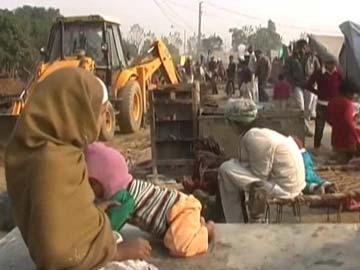 Muzaffarnagar, Dec 31: Over 70 families, allegedly evicted by the Uttar Pradesh government from a relief camp in Muzaffarnagar, are now forced to live in a bus stand with no electricity, water or toilet.
Muzaffarnagar, Dec 31: Over 70 families, allegedly evicted by the Uttar Pradesh government from a relief camp in Muzaffarnagar, are now forced to live in a bus stand with no electricity, water or toilet.
The families have taken shelter in the bus stand at Neem Kheri village, three km away from Loi camp in the riot-hit district situated around 500 km away from state capital Lucknow.
It was the last batch of families evicted in the last three days from the Loi camp, where over 300 families had taken shelter after the communal riots killed over 60 people and displaced more than 40,000 in September. "I think some sort of pressure is being exerted on those who run the camp. For the first time, they are telling us to leave," said Moumin, who along with his sister, Moumina, had to leave. They have 12 children and a disabled father in the 20-member joint family. The state government is allegedly demolishing its camps and forcing the victims out to avoid constant media attention over the lack of medical and other facilities at the make-shift camps. Official figures say at least 34 children have died in the relief camps since September.
Many victims have refused to leave, fearing they may be cheated out of their compensation. The Akhilesh Yadav government has promised Rs. 5 lakh to the riot-affected.
"167 families have been paid compensation and they left. The remaining families will also leave gradually. We are not abandoning them. They have been given a week's ration and we are keeping track of where they go," said Indramani Tripathi, Additional District Magistrate, Muzaffarnagar.
But reports on the ground suggest they are being forced to leave by local government officials.
"We will only leave when we get our compensation," said Pushpa Saifi, a mother of three.
Akhilesh Yadav, nettled by a series of NDTV reports on the conditions in Muzaffarnagar's camps, yesterday refused to take a question from the channel at a press conference in Lucknow.
"I won't take your questions," the 40-year-old said.





Comments
Add new comment